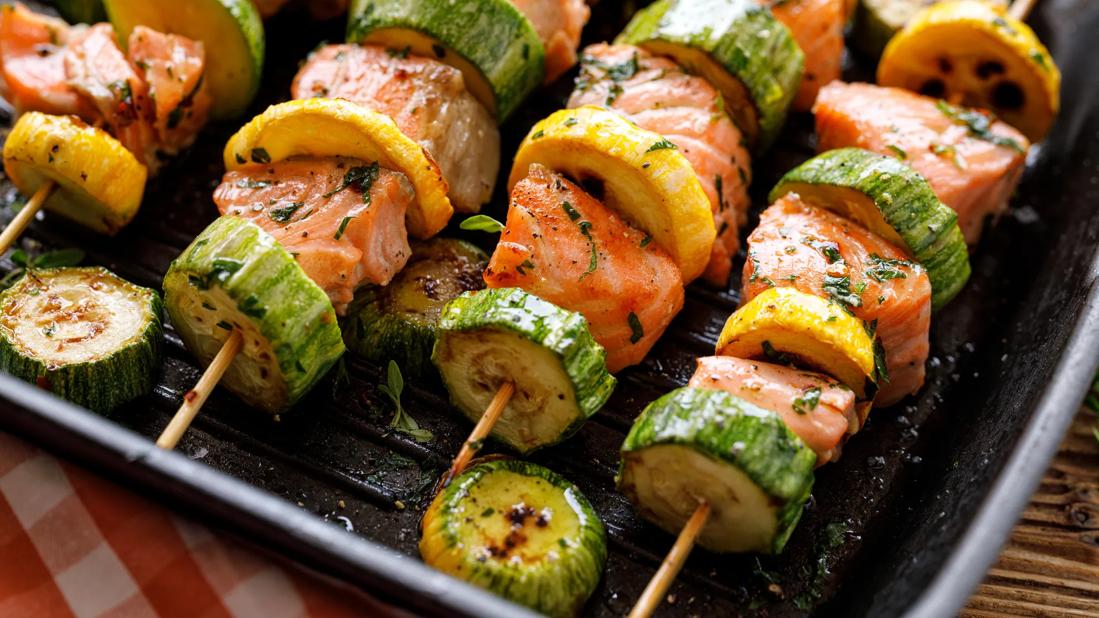Opt for plant-based foods and consider limiting alcohol and caffeine

Image content: This image is available to view online.
View image online (https://assets.clevelandclinic.org/transform/870603a8-c923-48ab-abf9-cd5425608875/salmon-vegetables-1263575951)
Grilled salmon and veggie skewers
If you’ve been diagnosed with an irregular heart rhythm, a condition known as atrial fibrillation (AFib), eating heart-healthy foods can help manage your condition. But in some cases, caffeine, alcohol and certain foods can often trigger AFib symptoms, such as heart palpitations or dizziness.
Advertisement
Cleveland Clinic is a non-profit academic medical center. Advertising on our site helps support our mission. We do not endorse non-Cleveland Clinic products or services. Policy
While there’s no specific “AFib diet,” the American Heart Association recommends eating foods low in saturated fats, trans fats, salt and cholesterol.
Registered dietitian Julia Zumpano, RD, LD, shares what foods may help, and which you might want to avoid.
Zumpano recommends focusing on eating plant-based foods to manage a racing heartbeat. This means building meals and snacks that are rich in fruits, vegetables, legumes, fish, nuts and olive oil.
The Mediterranean diet and the DASH diet are good examples of eating plans based on those foods.
“The DASH and Mediterranean diets have both been clinically studied and proven to support overall heart health, including the management of blood pressure, blood cholesterol, blood sugar, triglycerides and weight management,” says Zumpano.
If you have atrial fibrillation, specific nutritious foods that are a great addition to your diet include:
Advertisement
“Plant-based foods are rich in vitamins, minerals, fiber and antioxidants. They’re naturally low in saturated fat and void of cholesterol,” explains Zumpano. “Aim to eat a fruit or vegetable from each color of the rainbow every day.”
You may want to consider avoiding or limiting the following:
When it comes to AFib and drinking alcohol or treating yourself to a piece of cake, Zumpano says that you don’t necessarily have to cut these items completely out of your life to manage your AFib. You may just need to learn your threshold — how much your body can tolerate before AFib symptoms kick in.
Consider removing certain foods from your diet for a few days as a test. Then, reintroduce small amounts (for example, a half-cup of coffee) to see if your symptoms return. If not, you can slowly add more and monitor how you feel.
“There’s no one-size-fits-all answer on what will work best for you,” she adds. “You’ll just need to experiment a bit.”
Zumpano suggests some other food-based adjustments that can help manage your AFib symptoms:
If you have obesity, take a blood thinner or have been diagnosed with diabetes or other health conditions, talk to your healthcare provider about safe ways to modify your diet to help manage your AFib symptoms.
The reason? Even a seemingly “healthy” dietary change could conflict with another treatment. For instance, certain blood thinners like warfarin may be affected by foods with high amounts of vitamin K (think spinach and kale).
Advertisement
“You can help minimize your symptoms by finding your threshold for common triggers like alcohol and caffeine and following a plant-based diet,” reiterates Zumpano. “Consider working with a registered dietitian to come up with an eating plan that’s customized to you.”
Advertisement

Sign up for our Health Essentials emails for expert guidance on nutrition, fitness, sleep, skin care and more.
Learn more about our editorial process.
Advertisement
Having atrial fibrillation increases your risk of stroke — but blood thinners can help for many people
Making healthy lifestyle changes ahead of surgery can help you avoid AFib after
The short answer from a cardiovascular researcher
Knowing the facts can make all the difference
The short answer from a cardiologist
Protect your teeth and ease strain with a nightguard, better sleep habits and other changes
A variety of stressors can leave you with bald patches or thinning hair
Recovery takes about 12 weeks, but you’ll likely feel a lot better by six weeks after surgery
Prioritize your health by managing stress, strengthening your social connections and getting quality sleep
Bolsters, blankets, pillows and blocks can offer extra support, stability and comfort
Allergies, postnasal drip, asthma or reflux could be to blame for a cough that won’t quit